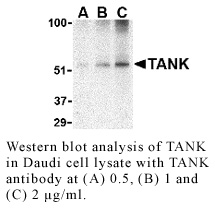Anti-Human TANK (CT)
Data
- -
- -
Antibody DetailsProduct DetailsReactive Species Human Host Species Rabbit Immunogen PN:T299 Product Concentration 0.5 mg/ml Formulation This polyclonal antibody is formulated in phosphate buffered saline (PBS) pH 7.4 containing 0.02% sodium azide as a preservative. Storage and Handling This polyclonal antibody is stable for at least one week when stored at 2-8°C. For long term storage, aliquot in working volumes without diluting and store at –20°C in a manual defrost freezer. Avoid Repeated Freeze Thaw Cycles. Country of Origin USA Shipping Next Day Ambient RRIDAB_2831874 Each investigator should determine their own optimal working dilution for specific applications. See directions on lot specific datasheets, as information may periodically change. DescriptionDescriptionSpecificity Rabbit Anti-Human TANK recognizes an epitope near the C-terminus of Human, Mouse and Rat TANK. This polyclonal antibody was purified using affinity chromatography. Background TANK was initially identified as a novel TRAF-interacting protein that regulated TRAF-mediated signal transduction. Specifically, ligand binding by surface receptors in the tumor necrosis factor (TNF) receptor and Toll/interleukin-1 (IL-1) receptor families lead to the formation of a TRAF/TANK complex that mediates the activation of the transcription factor NF-κB. This activation of NF-κB occurs through an association with the kinases IKKε and TBK1. More recently, it was shown that these proteins can then form a complex with NEMO, a protein that regulates the activity of the IκB complex. This suggests that in addition to the possibility that TBK1 and IKKε activate the IKKs, the association with the IKK complex may help these kinases modulate other functions, such as the transactivation potential of NF-κB proteins. At least two isoforms of TANK are known to exist. PubMed References & Citations1. Cheng, G. et al. (1996) Genes Dev. 10:963 2. Rothe, M. et al. (1996) Proc. Natl. Acad. Sci. USA 93:8241 3. Pomerantz, JL. et al. (1999) EMBO J. 18:6694 4. Chariot, A. et al. (2002) J. Biol. Chem. 277:37029 Technical ProtocolsCertificate of Analysis |
Related Products
- -
- -
Prod No. | Description |
|---|---|
T277 | |
T278 | |
T300 | |
T299 |



